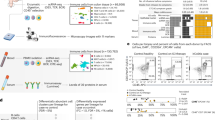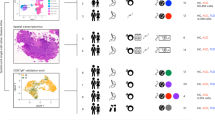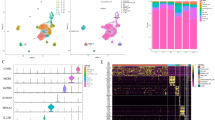Abstract
A previous report by this laboratory demonstrated that bacterial iron chelator (siderophore) triggers inflammatory signals, including the production of CXC chemokine IL-8, in human intestinal epithelial cells (IECs). Microarray-based gene expression profiling revealed that iron chelator also induces macrophage inflammatory protein 3 α (MIP-3α)/ CC chemokine-ligand 20 (CCL20). As CCL20 is chemotactic for the cells involved in host adaptive immunity, this suggests that iron chelator may stimulate IECs to have the capacity to link mucosal innate and adaptive immunity. The basal medium from iron chelator deferoxamine (DFO)-treated HT-29 monolayers was as chemotactic as recombinant human CCL20 at equivalent concentrations to attract CCR6+ cells. The increase of CCL20 protein secretion appeared to correspond to that of CCL20 mRNA levels, as determined by real-time quantitative RT-PCR. The efficacy of DFO at inducing CCL20 mRNA was also observed in human PBMCs and in THP-1 cells, but not in human umbilical vein endothelial cells. Interestingly, unlike other proinflammatory cytokines, such as TNF-α and IL-1β, a time-dependent experiment revealed that DFO slowly induces CCL20, suggesting a novel mechanism of action. A pharmacologic study also revealed that multiple signaling pathways are differentially involved in CCL20 production by DFO, while some of those pathways are not involved in TNF-α-induced CCL20 production. Collectively, these results demonstrate that, in addition to some bacterial products known to induce host adaptive immune responses, direct chelation of host iron by infected bacteria may also contribute to the initiation of host adaptive immunity in the intestinal mucosa.
Similar content being viewed by others
Article PDF
Author information
Authors and Affiliations
Rights and permissions
This is an Open Access article distributed under the terms of the Creative Commons Attribution Non-Commercial License (http://creativecommons.org/licenses/by-nc/3.0/) which permits unrestricted non-commercial use, distribution, and reproduction in any medium, provided the original work is properly cited.
About this article
Cite this article
Lee, HJ., Choi, SC., Choi, EY. et al. Iron chelator inducesMIP-3α/CCL20 in human intestinal epithelial cells: implication for triggering mucosal adaptive immunity. Exp Mol Med 37, 297–310 (2005). https://doi.org/10.1038/emm.2005.40
Published:
Issue date:
DOI: https://doi.org/10.1038/emm.2005.40
Keywords
This article is cited by
-
Antimicrobial peptide β-defensin-1 expression is upregulated in Alzheimer’s brain
Journal of Neuroinflammation (2013)



